{{currentView.title}}
July 01, 2024
Iran Update, July 1, 2024
Information Cutoff: 2:00 pm ET
The Iran Update provides insights into Iranian and Iranian-sponsored activities abroad that undermine regional stability and threaten US forces and interests. It also covers events and trends that affect the stability and decision-making of the Iranian regime. The Critical Threats Project (CTP) at the American Enterprise Institute and the Institute for the Study of War (ISW) provides these updates regularly based on regional events. Click here to see CTP and ISW’s interactive map of Israeli ground operations. This map is updated daily alongside the static maps present in this report. Click here to subscribe to the Iran Update.
CTP-ISW defines the “Axis of Resistance” as the unconventional alliance that Iran has cultivated in the Middle East since the Islamic Republic came to power in 1979. This transnational coalition is comprised of state, semi-state, and non-state actors that cooperate to secure their collective interests. Tehran considers itself to be both part of the alliance and its leader. Iran furnishes these groups with varying levels of financial, military, and political support in exchange for some degree of influence or control over their actions. Some are traditional proxies that are highly responsive to Iranian direction, while others are partners over which Iran exerts more limited influence. Members of the Axis of Resistance are united by their grand strategic objectives, which include eroding and eventually expelling American influence from the Middle East, destroying the Israeli state, or both. Pursuing these objectives and supporting the Axis of Resistance to those ends have become cornerstones of Iranian regional strategy.
We do not report in detail on war crimes because these activities are well-covered in Western media and do not directly affect the military operations we are assessing and forecasting. We utterly condemn violations of the laws of armed conflict and the Geneva Conventions and crimes against humanity even though we do not describe them in these reports.
Hardline presidential candidate Saeed Jalili will likely win the Iranian presidential election in the runoff race on July 5. No candidate received the majority of votes needed to win the Iranian presidential election on June 28 and Iran will hold a runoff election between the two most popular candidates—ultraconservative Saeed Jalili and reformist Masoud Pezeshkian—on July 5.[i] Pezeshkian received 10.4 million votes while Jalili received around 9.5 million. The second most prominent hardline candidate—Mohammad Bagher Ghalibaf—received around 3.4 million votes in the first round of elections on June 28, which was not enough to compete in the runoff election.[ii] At least some Ghalibaf voters will presumably back Jalili in the runoff election, however, giving Jalili a significant advantage over Pezeshkian. Pezeshkian has also struggled to consolidate support among Iranian youth, a key voter demographic for the reformist faction.[iii] Pezeshkian is unlikely to garner enough support to win against Jalili, especially since social media users have circulated statements in recent days of Pezeshkian boasting about his role in enforcing unpopular policies such as mandatory veiling.[iv]
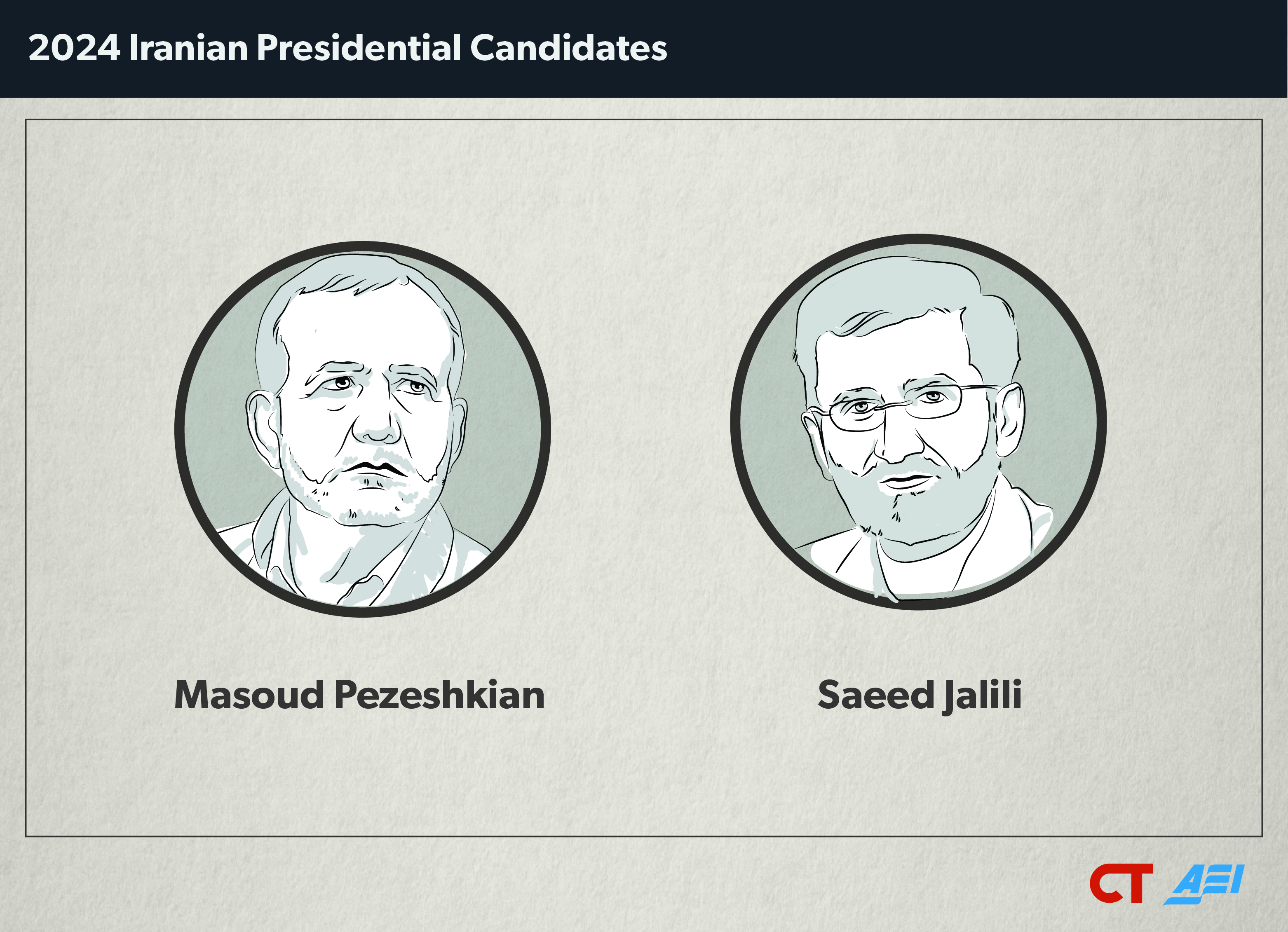
The Iranian regime is attempting to frame the July 5 presidential runoff elections as a fair and competitive race, despite Supreme Leader Ali Khamenei indicating a preference for hardline candidate Saeed Jalili. Khamenei has repeatedly expressed concern about low voter turnout rates in recent years and views participation in Iran’s presidential elections as a demonstration of Iran’s democratic legitimacy.[v] Iranian regime officials during this election cycle have attempted to reinforce the regime’s democratic legitimacy by boasting that Pezeshkian’s candidacy illustrated the legitimacy of Iran’s electoral process.[vi] Some Iranian university students confronted Pezeshkian in a meeting on June 16, framing his candidacy as an effort on the part of the regime to contribute to an “illusion of democracy” and an attempt by the regime to legitimize the elections.“[vii] The June 28 voter turnout rate was nevertheless unprecedently low at 40 percent, with the lowest recorded rates in Kermanshah, Kurdistan and Tehran provinces.[viii] It is noteworthy that a significant percentage of anti-regime protests during the Mahsa Amini movement occurred in Kurdistan and Tehran provinces, suggesting continued disillusionment with the Iranian regime in these regions.[ix]
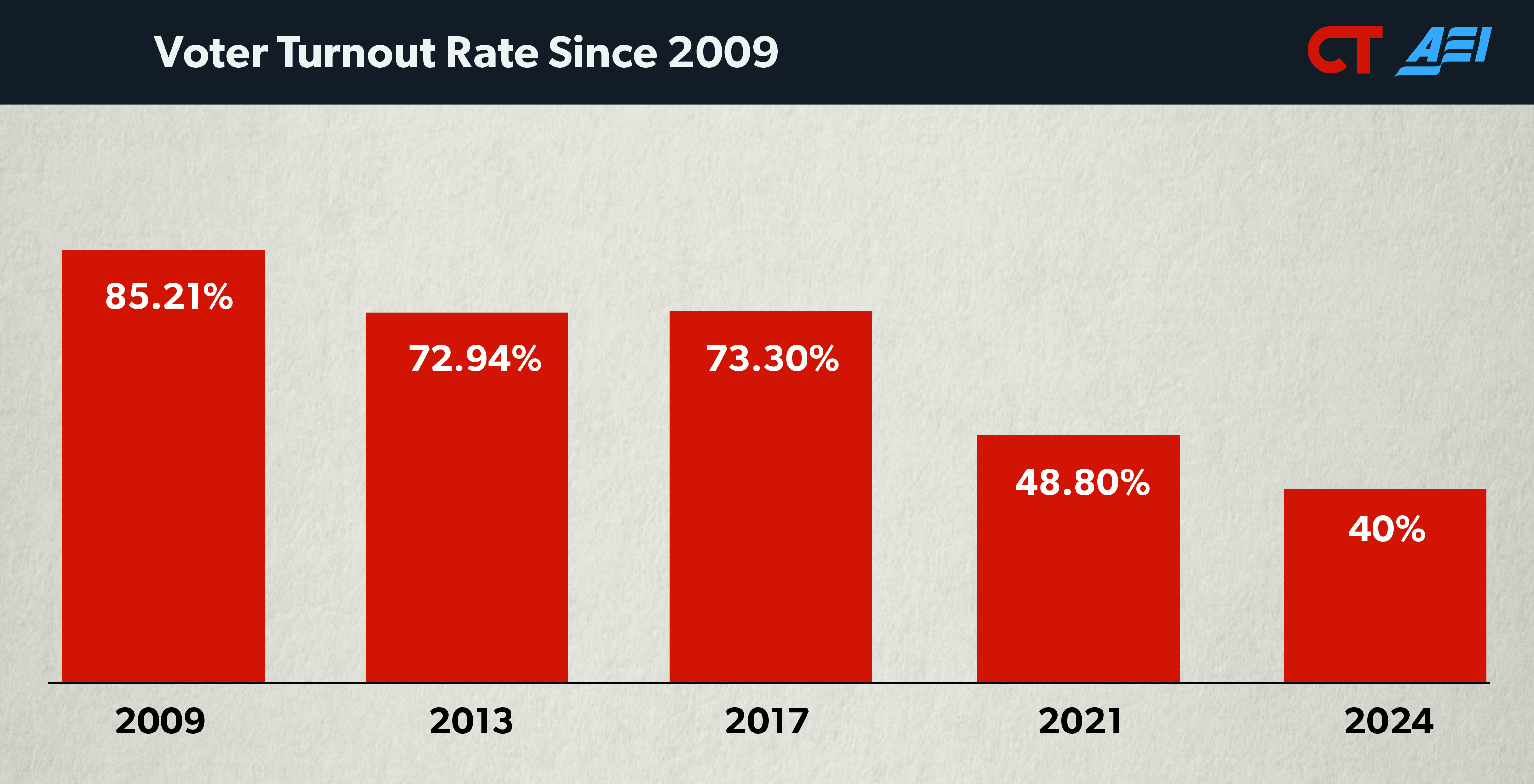
Khamenei and segments of Iran’s clerical establishment have indirectly demonstrated a preference Jalili in recent days, making a Pezeshkian win unlikely regardless of how many votes he receives. Khamenei expressed foreign and nuclear policy views on June 25 that closely align with ultraconservative hardline presidential candidate Saeed Jalili’s views, suggesting that Khamenei endorses Jalili.[x] Khamenei also indirectly criticized Pezeshkian’s campaign policies on the same date, making it unlikely that Khamenei will permit him to become president. Segments of the Iranian clerical establishment may also back Jalili. Reformist-affiliated Entekhab News posted a screenshot on July 1 that it claimed showed coordination among Iranian clerics to campaign for Jalili in villages and cities across Iran.[xi] Entekhab also circulated reports on July 1 that the influential Qom Seminary in Iran will close this week for its students and teachers to help improve voter turnout. Entekhab suggested that the Qom Seminary closures corroborated reports of clerics campaigning for Jalili.[xii] It is likely, if the Qom Seminary closures are indeed connected with reports of clerics campaigning, that students and teachers will disperse to their hometowns—specifically rural areas—to generate support for Jalili. Rural and sparsely populated areas have historically served as a bastion of support for the regime and its hardline policies.[xiii] Roughly 35 percent of the Iranian population lives in rural areas and political engagement in these areas could furthermore improve voter turnout rates while benefiting Jalili.[xiv]
The Supreme Leader will risk further deteriorating regime legitimacy in the unlikely event that Pezeshkian garners enough votes to win the election. Khamenei has criticized Pezeshkian’s policies and echoed Jalili’s nuclear and foreign policies, indicating that Khamenei endorses Jalili over Pezeshkian. It is therefore unlikely that Khamenei will permit Pezeshkian to win, regardless of whether Pezeshkian receives the majority of votes. Raisi’s 2021 election suggests that Khamenei is comfortable engineering elections to advantage his preferred candidate.[xv] The Guardian Council denied the candidacies of several prominent politicians in the 2021 elections and Raisi therefore faced no significant competition in the race. It is unclear, however, how Khamenei will advantage his preferred candidate if Pezeshkian is able to generate increased support and win the election this week. The regime engineered the election results between reformist Mir Hossein Mousavi and hardline Mahmoud Ahmadinejad in 2009, galvanizing a months-long anti-regime protest wave.[xvi] Khamenei will risk further deteriorating regime legitimacy and possibly kickstarting unrest in the unlikely event that Pezeshkian garners significant support in the coming days.
Palestinian militia groups in the West Bank appear to be strengthening at the expense of the Palestinian Authority. Palestinian militia fighters, Israeli military officials, and Palestinian Authority officials told the New York Times that Palestinian militia organizations control refugee camps in the West Bank by refusing to allow Palestinian Authority security forces to enter.[xvii] Palestinian fighters have prevented Palestinian Authority officials from entering refugee camps since before October 7, according to Palestinian media.[xviii] Fighters in Nur al Shams, east of Tulkarm, fired small arms at Palestinian Authority forces in June 2023 when the Palestinian Authority attempted to remove barriers that Palestinian militia fighters had placed at the entrances of the camp to prevent Israeli forces from entering.[xix] Palestinian militia control of refugee camps in the West Bank provides a relatively safe area for Palestinian militias to build new capabilities and plan operations against both the IDF and the Palestinian Authority.
The Palestinian Authority’s inability to exert effective control over refugee camps in the West Bank has significant implications for the post-war situation in the Gaza Strip, if these statements to the New York Times are accurate. The Palestinian Authority remains extremely unpopular, and Hamas will be able to easily justify continued resistance to the Palestinian Authority in the Gaza Strip if the authority assumes control with Israeli backing. A surviving Hamas in the Gaza Strip will attempt to rapidly resume its control over the Gaza Strip and continue its efforts to undermine the Palestinian Authority in the West Bank. Hamas sees control over the Gaza Strip as an interim step to creating an Islamist Palestinian state controlling all of Israel and the Palestinian territories.[xx]
The Iranian-guided effort to establish combined battalions in the West Bank since at least 2022 is almost certainly contributing to the gradual strengthening of Palestinian militia groups in the West Bank. Palestinian militias—under Iranian direction—have created a series of combined battalions in the West Bank since at least 2022, modeled on the Lion’s Den militia in Nablus.[xxi] The New York Times interviewed a former Fatah militia member who had defected to Palestinian Islamic Jihad and now leads one of these combined battalions in Tulkarm.[xxii] This battalion includes all Palestinian factions in the area, including PIJ, Hamas, and the al Aqsa Martyrs’ Brigade.[xxiii] Palestinian militias in combined units are able to unify planning and logistics by combining their resources, thus improving the militias’ capabilities and efficiency in aggregate.
Israeli security measures will likely constrain the groups’ ability to quickly expand their capabilities, however. Israeli counter-smuggling efforts and IDF control over access to the West Bank make it challenging for Palestinian militia groups to successfully access enough materiel to build advanced explosive devices or weapon systems at scale. Israeli security forces have successfully interdicted relatively large smuggling operations throughout and prior to this war.[xxiv] Major Israeli raids also disrupt the activity of nascent militia cells before these cells have time to build large stockpiles of weapons and explosives.[xxv] CTP-ISW has not observed a major and consistent change in militia capabilities during the war.
Iran is likely continuing its efforts to arm West Bank militias by smuggling arms through Jordan into the West Bank. The IDF thwarted an attempt to smuggle handguns and rifle parts into the West Bank from Jordan on July 1.[xxvi] Three smugglers attempted to cross the border from Jordan into the northern West Bank.[xxvii] Israeli border police and the IDF searched the area and discovered three bags containing over 75 handguns and dozens of M16 rifle components, including upper receivers, bolts, and charging handles.[xxviii] Israeli security forces have not apprehended the three suspects at the time of writing.[xxix] The July 1 smuggling attempt is consistent with other Iranian-backed smuggling attempts.
Iran is supplying Palestinian militias with weapons to improve their capabilities and to foment unrest against Israel.[xxx] Both Israeli and Jordanian police have thwarted numerous attempts in recent months by Iran and its partners to transport small arms, explosives, mines, and rockets across the Jordan-West Bank border.[xxxi] Iranian-backed smugglers often use established multinational narcotics-smuggling networks and routes to smuggle arms from Syria into Jordan.[xxxii]
The Israel Defense Forces (IDF) 98th Division continued clearing operations to degrade a reconstituted Hamas battalion and to demolish underground military infrastructure in Shujaiya, Gaza City, on July 1.[xxxiii] The IDF re-entered Shujaiya on June 27.[xxxiv] Hamas fighters in Shujaiya have targeted Israeli forces with sophisticated weapons, such as explosively formed penetrators, supporting the IDF assessment that the Hamas Shujaiya Battalion has at least partially reconstituted since the IDF last operated in the area in April 2024.[xxxv] The IDF killed Hamas‘ Shujaiya Battalion commander and his deputy in December 2023, which led them to conclude the battalion was ”significantly damaged.”[xxxvi] The IDF assesses that Hamas has partially rebuilt its battalion from new recruits and Hamas fighters from other degraded battalions.[xxxvii] One element of reconstitution is reorganization, in which a commander redistributes the resources at their disposal to restore attrited units to a minimal level of effectiveness.[xxxviii] Building composite units by combining several degraded or combat ineffective battalions is one common way to reorganize a force to be minimally combat effective. Israeli forces operating in Shujaiya have also destroyed weapons productions sites during the past several days of operations, indicating that Hamas’ Shujaiya Battalion is also pursuing small-scale weapons production to replenish its stockpiles and aid in regeneration tasks.[xxxix] CTP-ISW previously observed that Hamas cells have probably established a rear area in Jabalia or northern Shujaiya, from which they can mount attacks on IDF units along the Israel-Gaza Strip border.[xl]
The IDF issued evacuation orders for eastern Khan Younis on July 1.[xli] An IDF evacuation order typically means that Israeli forces will enter the area within 24 hours to begin clearing operations.[xlii] PIJ launched 20 rockets from Khan Younis into southern Israel roughly 10 hours before the IDF issued the order on July 1.[xliii] The IDF Air Force struck the launch site shortly after PIJ fired the barrage.[xliv] An Israeli military correspondent reported on June 23 that Hamas is reconstituting its military and governance structures in Khan Younis in the absence of Israeli force presence.[xlv] The IDF withdrew its forces from Khan Younis on April 7.[xlvi] Hamas is also working to reassert local control in Khan Younis by deploying fighters on the streets, managing local policing, and taking over humanitarian aid shipments.[xlvii] Hamas is restoring its governing organizations as well, which has prompted the IDF to target Hamas officials involved in these activities.[xlviii] Hamas’ reconstitution in Khan Younis is likely driving the IDF to conduct a short-term raid into Khan Younis. An IDF operation into Khan Younis may also target Hamas political and military leadership. CTP-ISW previously noted that the IDF’s decision to withdraw its forces from Khan Younis enabled Hamas militants and political leadership to flee to Khan Younis.[xlix] Hamas leader in the Gaza Strip Yahya Sinwar is likely hiding in a “vast” tunnel system beneath Khan Younis, according to unspecified US officials speaking to the New York Times.[l] Hamas fighters’ option to move northward contributed to their decision to not become decisively engaged in Rafah.
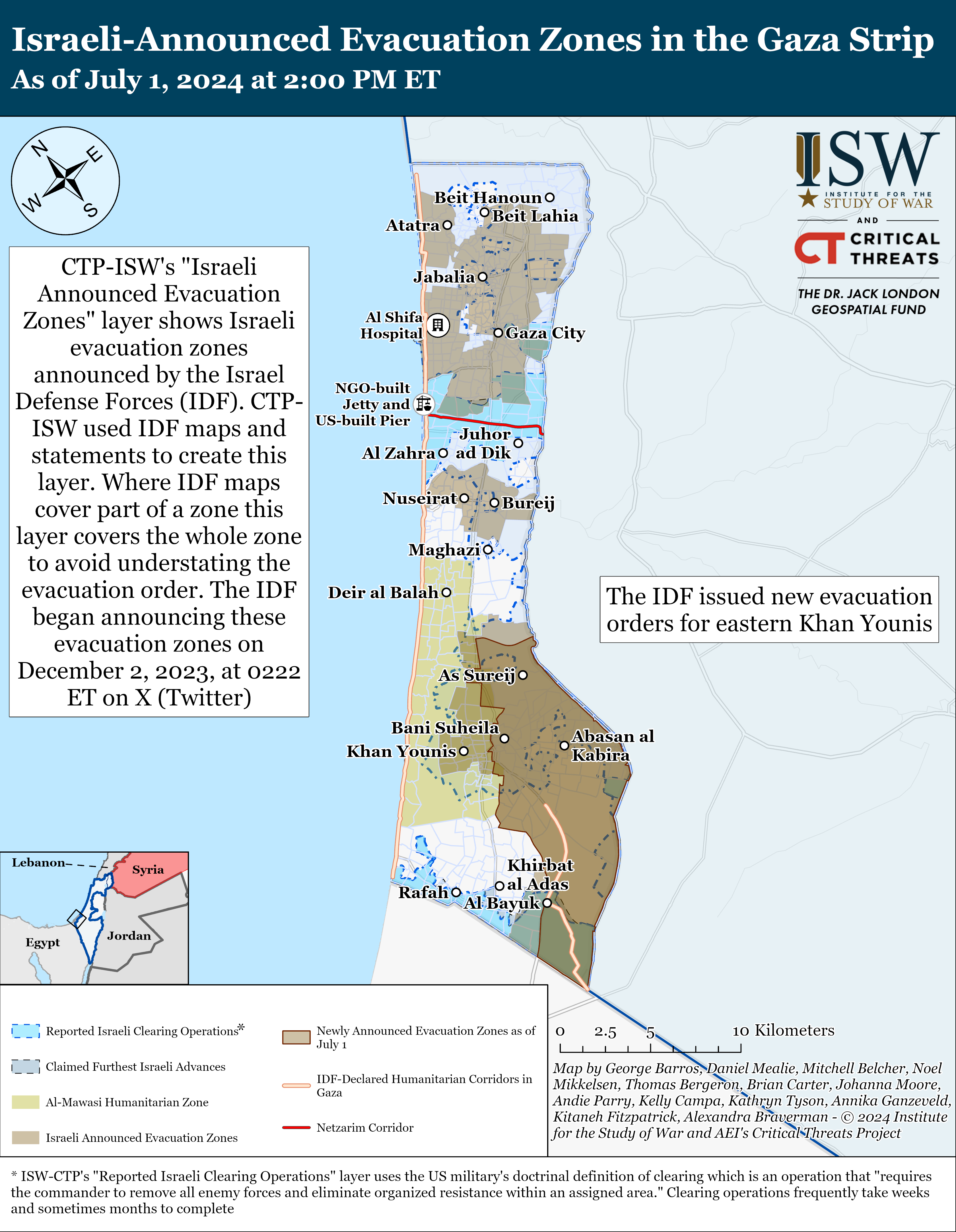
Iranian-backed Iraqi militias threatened to target US interests in Iraq and the Middle East in the event of an Israeli operation into southern Lebanon. The Iraqi Resistance Coordination Committee, a coordinating body comprised of Iranian-backed Iraqi militias, met on June 30 and threatened to target US interests in Iraq and the region and increase the “pace and type” of its operations if Israel launches a major military offensive into Lebanon.[li] Iranian-backed militias initially paused attacks against US forces in the region in February 2024 after IRGC Quds Force Commander Brigadier General Esmail Ghaani traveled to Baghdad and ordered a pause on the attack campaign after a Kataib Hezbollah drone attack killed three US soldiers in Jordan in January 2024.[lii] The militias’ announced strategy is partially inconsistent with a Saudi report that alleged Iranian-backed Iraqi militias would intervene in Lebanon by sending fighters and weapons to Lebanese Hezbollah if Israel launches a major military offensive into Lebanon. Both the IRGC and Hezbollah reportedly had reservations against such plans, which is consistent with the long-standing Iranian desire to avoid an overt regional war against the United States and Israel. The militia’s newly articulated strategy is more consistent with the militia’s attacks and involvement in the Israel-Hamas war thus far.[liii]
The Iraqi Resistance Coordination Committee most recently threatened to resume its attack campaign on US forces and interests in the Middle East on June 19, citing the Iraqi government’s failure to establish a timeline for a US troop withdrawal from Iraq.[liv] The June 30 Coordination Committee statement citing a possible Israeli offensive into Lebanon as a trigger for new attacks comes after individual attempts by Iranian-backed Iraqi militia groups to resume attacks on US forces.[lv] Emirati state media reported that other Islamic Resistance in Iraq militia leaders have disagreed with Kataib Hezbollah’s calls to resume attacks targeting US forces in Iraq since April 2024. Kataib Hezbollah has reportedly begun to ”reconsider” its decision to pause attacks.[lvi] Qais Khazali, who is the secretary general of Iranian-backed Iraqi militia Asaib Ahl al Haq, similarly threatened on June 24 to attack US interests if Israel launched a major military offensive into Lebanon.[lvii] Such calls appear to encourage action that would disobey the orders from the IRGC Quds Force commander in January to stop attacks.
The June 30 Iraqi Resistance Coordination Committee statement also identified targeting the under-construction Aqaba-Basra oil pipeline connecting Basra, Iraq to Aqaba port south of Jordan, as a “starting point” for new attacks.[lviii] The Coordination Committee claimed that Aqaba-Basra oil pipeline is a ”malicious project aimed at draining Iraqi resources and paving a path toward normalization with Israel”. The pipeline project is strategically important for Iraq as it will offer a key alternative port to Iraq’s currently existing exports terminal, eventually diversifying its export routes and linking Iraq’s economy with those of its Arab neighbors.[lix] The Coordination Committee and Iran may assess that this declared strategy of attacking Jordanian targets is less likely to elicit a US response and is therefore less risky than targeting US forces in the region. This lower-risk strategy would also be consistent with the long-standing Iranian desire to keep its militia activity at a level that does not cause the United States to seriously threaten Iranian assets.
Key Takeaways:
- Iran: Hardline presidential candidate Saeed Jalili will likely win the Iranian presidential election in the runoff race on July 5.
- West Bank: Palestinian militia groups in the West Bank appear to be strengthening at the expense of the Palestinian Authority. The Palestinian Authority’s inability to exert effective control over refugee camps in the West Bank has significant implications for the post-war situation in the Gaza Strip, if statements to Western Media about strengthening militia groups in the West Bank are accurate.
- Northern Gaza Strip: The IDF continued operations aimed at degrading a reconstituting Hamas Battalion in Shujaiya. Hamas commanders in Shujaiya may have formed a composite unit there by combining multiple degraded or combat ineffective units to form one combat effective unit. Forming a composite unit is one method through which reconstitution takes place.
- Southern Gaza Strip: The IDF issued evacuation orders for eastern Khan Younis on July 1. These evacuation orders typically precede Israeli operations.
- Iraq: Iranian-backed Iraqi militias threatened to target US interests in Iraq and the Middle East in the event of an Israeli operation into southern Lebanon. The groups identified the under-construction Aqaba-Basra oil pipeline between Basra, Iraq, and Aqaba, Jordan, as a starting point for a new attack campaign.
- Yemen: Houthi media published footage on June 30 of a Houthi attack targeting a bulk cargo carrier with a new model of unmanned surface vessel.
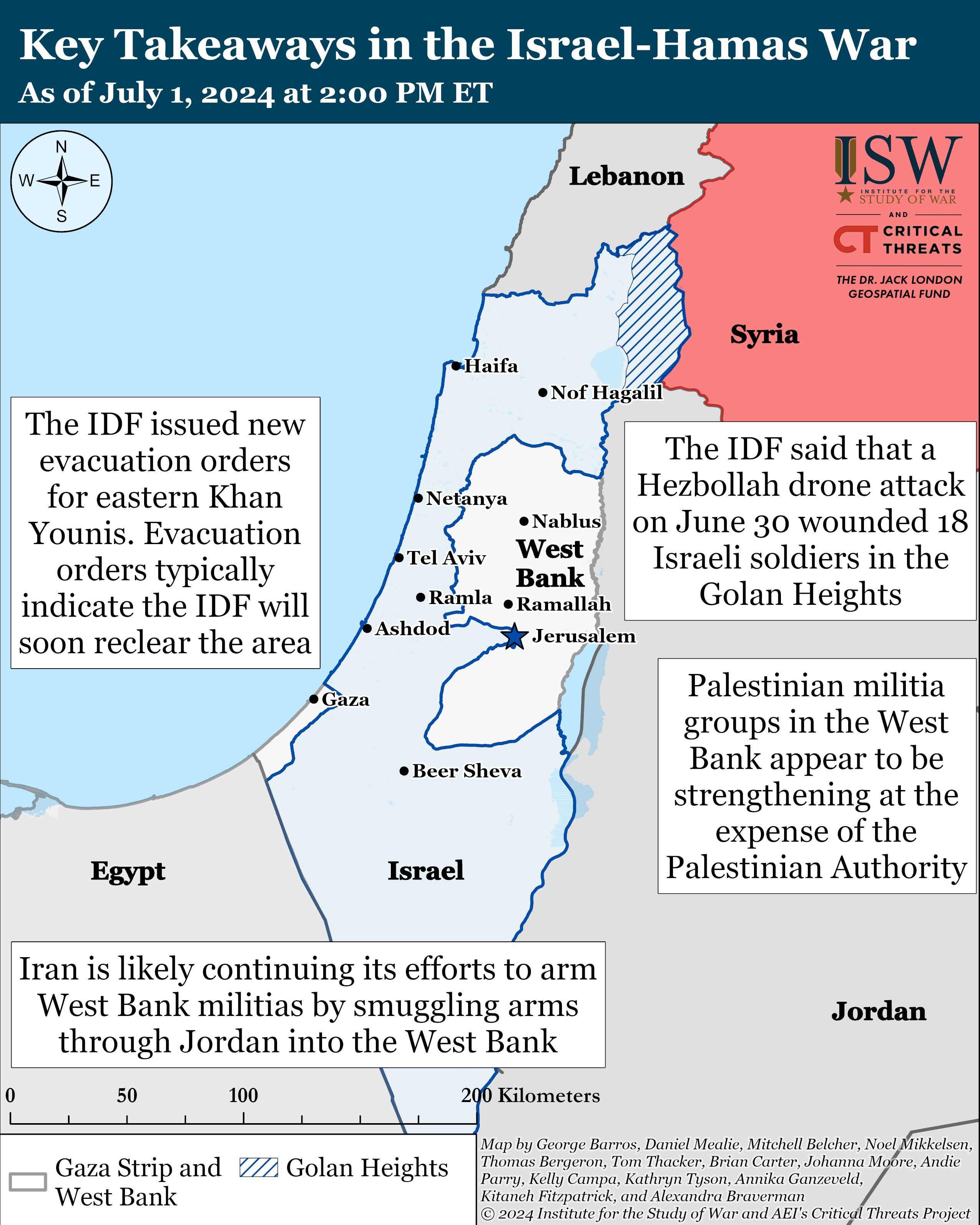
Gaza Strip
Axis of Resistance objectives:
- Erode the will of the Israeli political establishment and public to sustain clearing operations in the Gaza Strip
- Reestablish Hamas as the governing authority in the Gaza Strip
The IDF 99th Division continued operations along the Netzarim Corridor, south of Gaza City, on July 1. The IDF 8th Reservist Armored and 3rd Reservist Infantry Brigades have operated from the Netzarim Corridor to target Palestinian fighters and militia infrastructure for the past month.[lx] The IDF said on July 1 that the two brigades have killed dozens of Palestinian fighters and destroyed over 100 militia sites near the corridor.[lxi] An officer in the 3rd Brigade said that the 99th Division is consistently finding evidence of militia activity, such as weapons and explosives, in almost every building its forces enter near the corridor.[lxii] The two brigades, assisted by Yahalom combat engineers, have also discovered, investigated, and destroyed a 1 km-long tunnel south of Tal al Hawa over the past few weeks.[lxiii] Commercially available satellite imagery indicated that Israeli armor has cleared land north of the Netzarim corridor near Tal al Hawa since June 20. The IDF said that Palestinian fighters used the tunnel to move across the Strip.[lxiv] Palestinian Islamic Jihad (PIJ) mortared Israeli forces along the Netzarim Corridor on July 1.[lxv] The IDF 99th Division directed a strike on a Palestinian fighter who targeted Israeli forces with rocket fire.[lxvi]
Israeli forces destroyed an underground PIJ rocket factory in Tal al Sultan on July 1. The IDF 89th Commando and 401st Brigades assisted by the Yahalom engineering unit destroyed and raided a PIJ rocket production site underground in Tel al Sultan.[lxvii] The IDF said the site was the largest PIJ rocket and long-range rocket production site found this far in Gaza Strip.[lxviii] Israeli forces engaged Palestinian fighters above and below ground during the raid and demolition.[lxix] PIJ reportedly produced hundreds of rockets at the site that it used to target Israel over the past several years.[lxx] The IDF assessed the factory's destruction damaged PIJ's rocket production capability.[lxxi] Israeli clearing operations in Rafah have focused on dismantling Palestinian militia underground infrastructure, such as this underground rocket factory.
Palestinian fighters continued to target Israeli forces operating in several sectors of Rafah on July 1. Hamas detonated a house its fighters rigged to explode targeting Israeli forces inside in eastern Rafah on July 1.[lxxii] The explosion killed one Israeli soldier and injured nine others.[lxxiii] Palestinian fighters also targeted Israeli forces in western and central Rafah.[lxxiv] Local Palestinian reports indicated Israeli armor continues to hold positions along the Philadelphi corridor, which is consistent with the IDF’s plan to maintain operational control of the corridor to prevent Hamas from being resupplied with weapons from Egypt.[lxxv]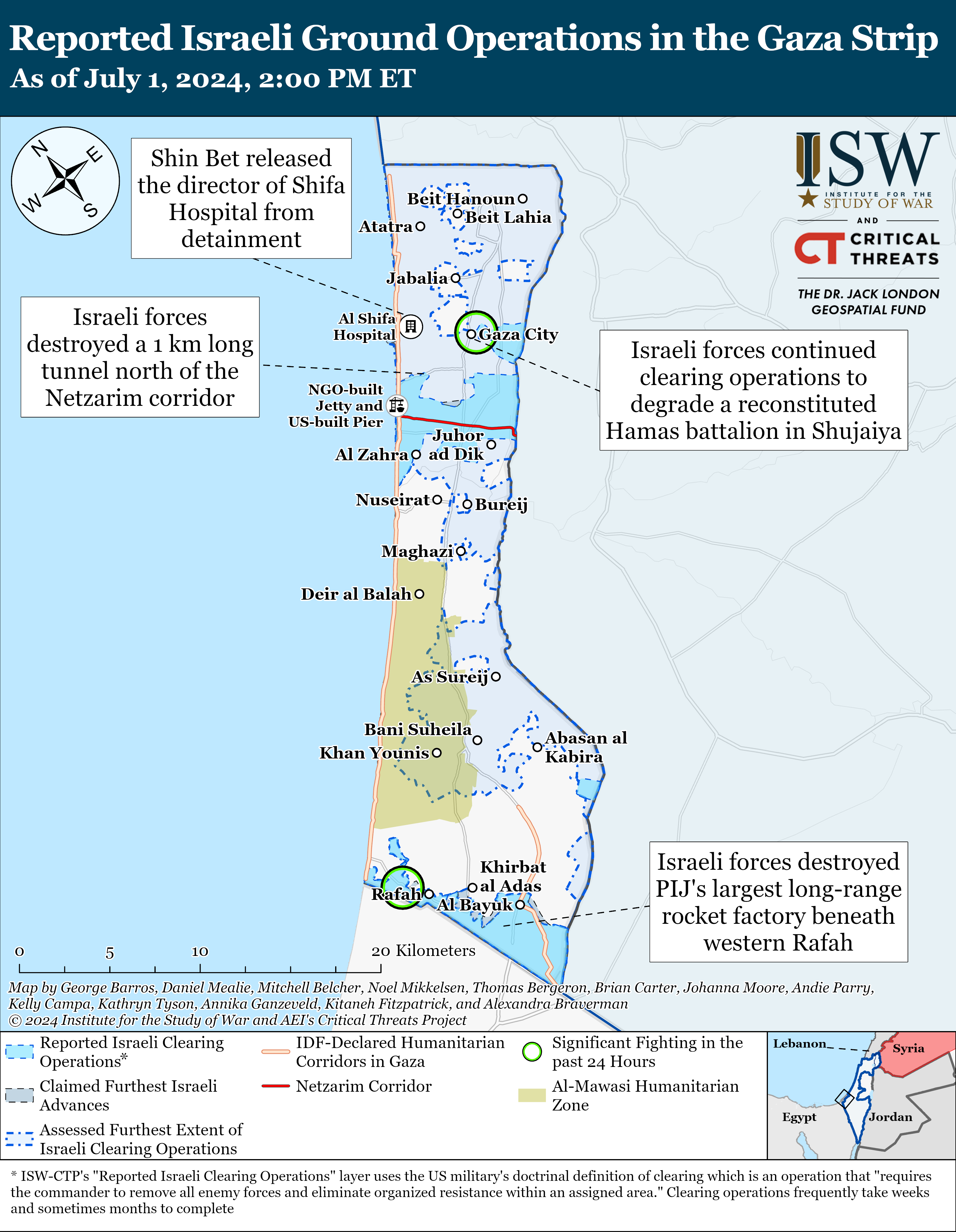

Shin Bet released Hamas-affiliated director of al Shifa Hospital from detention in Israel on July 1.[lxxvi] Shin Bet released 55 Palestinian detainees it deemed “least dangerous” due to a lack of space in Israeli detention facilities.[lxxvii] Al Shifa Hospital Director Mohamed Abu Salmiya was one of those released. Israeli forces detained Abu Salmiya in Gaza City on the grounds that he allowed Hamas to use the hospital as a command headquarters.[lxxviii] Israel said that the director allowed Hamas to use the hospital’s electricity to strengthen the underground tunnel network.[lxxix] The Israeli defense minister and prime minster both condemned Shin Bet’s decision to release Abu Salmiya.[lxxx] Shin Bet directly blamed Israeli National Security Minister Ben Gvir’s policies for the overcrowded conditions at Israeli detention facilitates that necessitated the July 1 release.[lxxxi] Israeli Prime Minister Netanyahu called for in immediate inquiry into the hospital director’s release.[lxxxii]
Palestinian militias launched two rocket barrages targeting eight Israeli towns and military sites near the Gaza Strip on July 1.[lxxxiii]
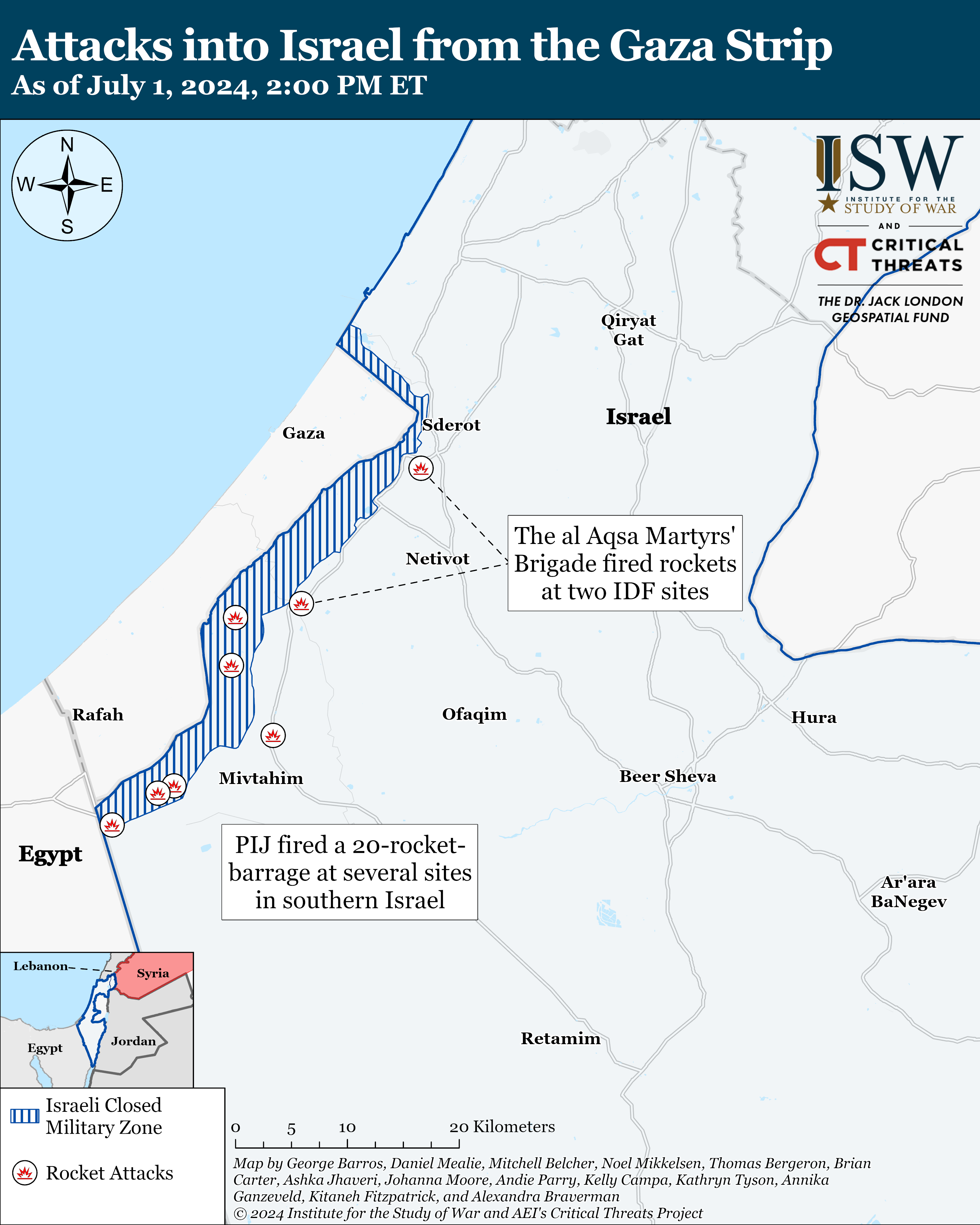
Recorded reports of attacks; CTP-ISW cannot independently verify impact.
West Bank
Axis of Resistance objectives:
- Establish the West Bank as a viable front against Israel
Israeli forces have engaged Palestinian fighters in at least two locations since CTP-ISW's last data cut-off on June 30.[lxxxiv] Hamas, the al Aqsa Martyrs’ Brigades, and Palestinian Islamic Jihad fired small arms and detonated improvised explosive devices (IED) in separate attacks targeting Israeli forces conducting a raid in Tulkarm.[lxxxv]
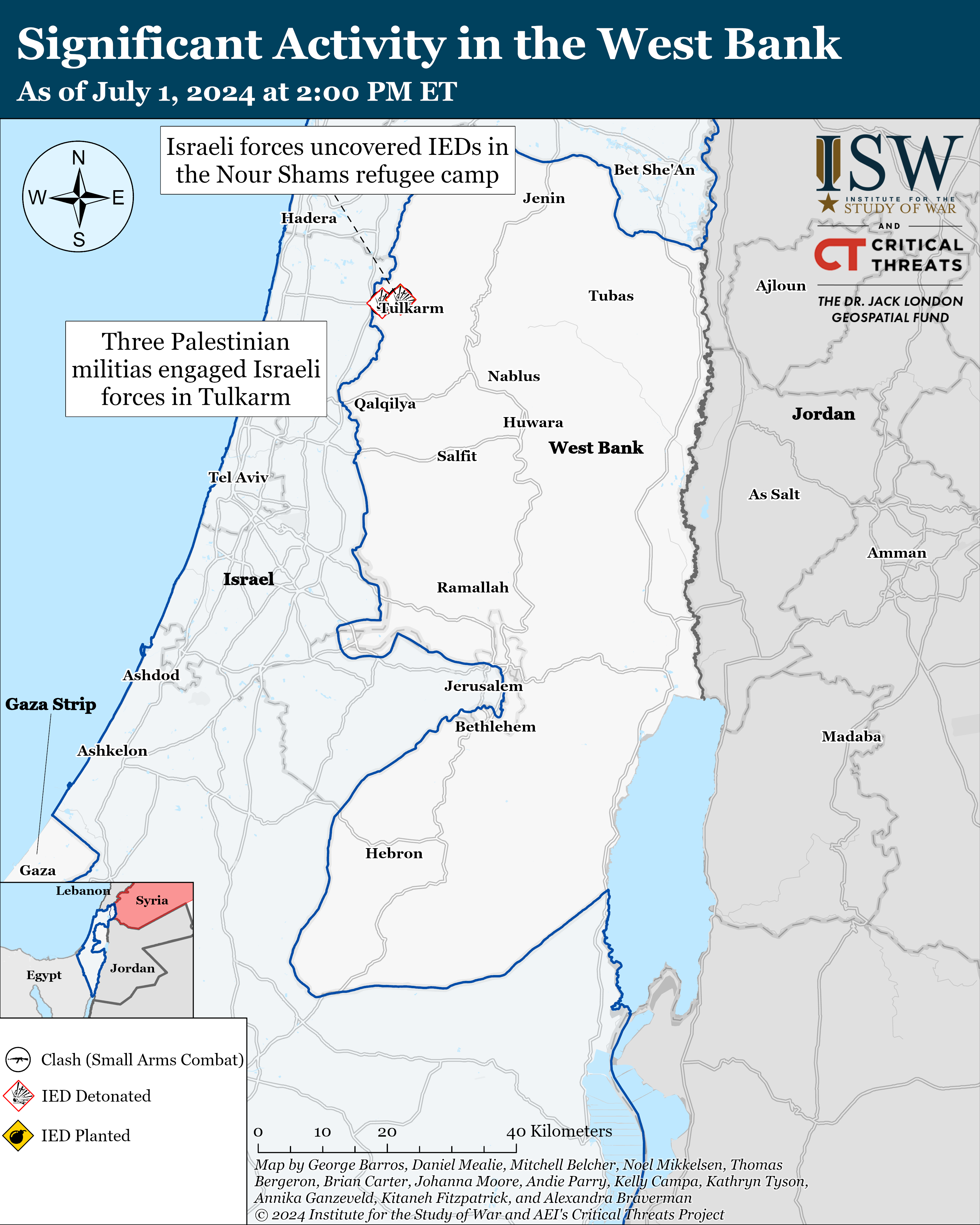
This map is not an exhaustive depiction of clashes and demonstrations in the West Bank.
Southern Lebanon and Golan Heights
Axis of Resistance objectives:
- Deter Israel from conducting a ground operation into Lebanon
- Prepare for an expanded and protracted conflict with Israel in the near term
- Expel the United States from Syria
Lebanese Hezbollah conducted at least six attacks into northern Israel on July 1.[lxxxvi] The IDF said on June 30 that a Hezbollah drone attack wounded 18 Israeli soldiers, including one soldier with serious injuries.[lxxxvii] Hezbollah said that the attack targeted the IDF 188th Brigade’s armored battalion at Rawiya barracks in the Golan Heights.[lxxxviii] The IDF has recently highlighted the difficulties it faces in intercepting Hezbollah drones.[lxxxix]
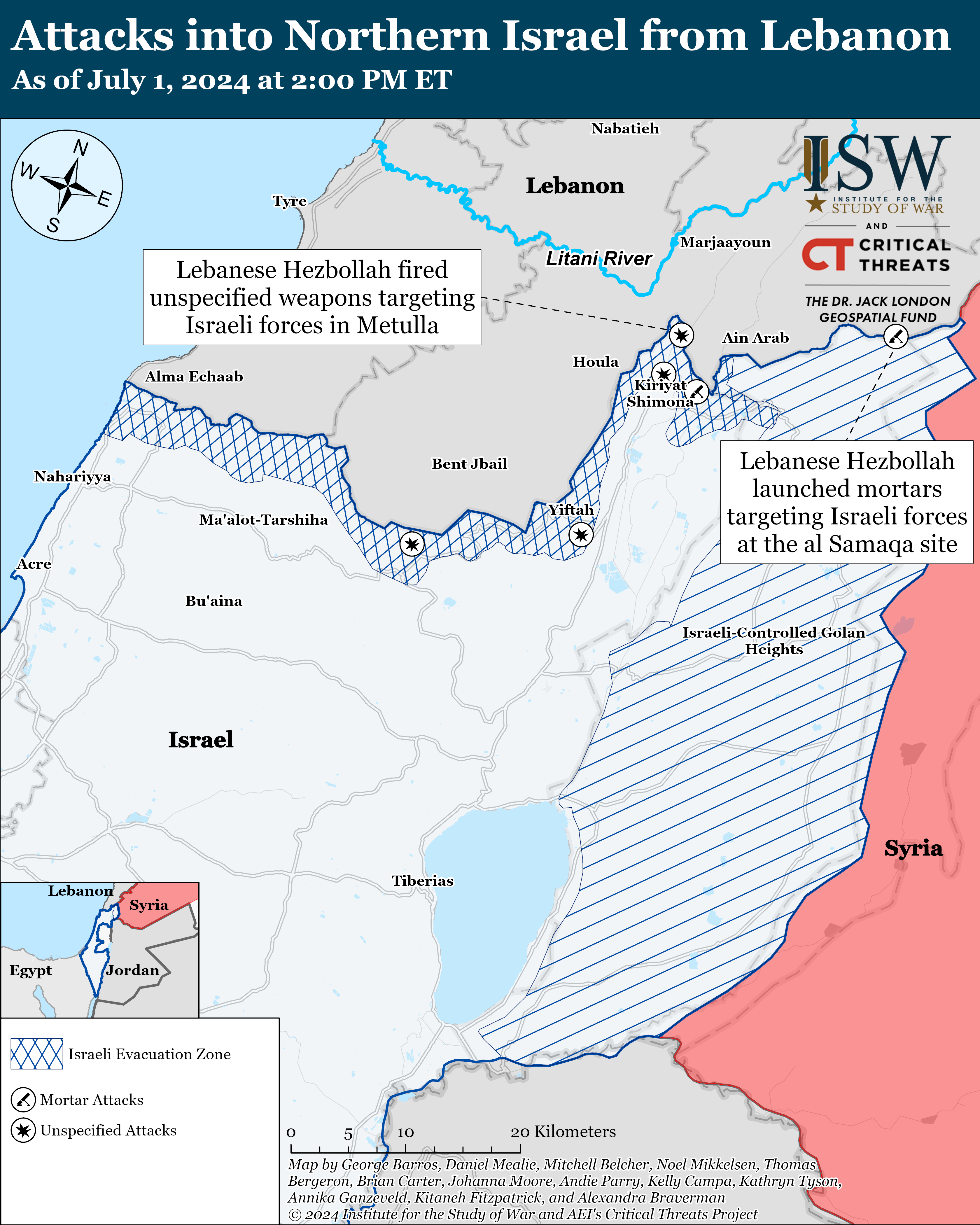
Recorded reports of attacks; CTP-ISW cannot independently verify impact.
Iran and Axis of Resistance
The Islamic Resistance of Iraq—a coalition of Iranian-backed Iraqi militias—claimed a drone attack on June 30 targeting an unspecified “vital target” in Eilat, southern Israel.[xc] The IDF has not acknowledged any such attack, and CTP-ISW cannot verify the claim at the time of this writing.
Two senior IRGC officials and the acting Iranian foreign affairs minister gave statements boasting about Iran and the Axis of Resistance’s ability to destroy Israel, criticizing Israel’s actions in the Israel-Hamas War, and praising Iran and the Axis of Resistance on June 30 and July 1. Military affairs adviser to the Supreme Leader Major General Yahya Rahim Safavi claimed that the Houthis have changed the power balance in the Bab al Mandeb in a speech on June 30.[xci] IRGC Air Force Brigadier General Amir Ali Hajizadeh separately warned that Iran is ”awaiting an opportunity for the True Promise II Operation” during a speech on July 1.[xcii] The first True Promise Operation was the Iranian drone and missile attack targeting Israel on April 13. Acting Iranian Foreign Affairs Minister Ali Bagheri Kani told Turkish Foreign Affairs Minister Hakan Fidan in a phone call on July 1 that Hezbollah is ”fully prepared” to resist any Israeli threats into Lebanon .”[xciii]
Houthi media published footage on June 30 of a Houthi attack targeting the Liberian-flagged, Greek-owned and -operated bulk cargo carrier M/V Transworld Navigator with a new model of unmanned surface vessel.[xciv] The Houthis conducted the attack that damaged the Transworld Navigator in the Red Sea on June 23.[xcv] The footage showed a Houthi-built, 10-meter-long unmanned naval vessel called “Destructive Flood.”[xcvi] The Houthis said that the Destructive Flood can carry a payload of 1,000 to 1,500kg of explosives.[xcvii]
US CENTCOM reported on June 30 that it destroyed three Houthi unmanned surface vessels (USV) in the Red Sea.[xcviii] CENTCOM stated that the USVs presented a threat to US, coalition, and merchant vessels in the Red Sea.

[i] https://www.understandingwar.org/backgrounder/iran-update-june-29-2024
[ii] https://www.understandingwar.org/backgrounder/iran-update-june-29-2024
[iii] https://www.understandingwar.org/backgrounder/iran-update-june-17-2024
[iv] https://x.com/hafezeh_tarikhi/status/1807704676130779281
[v] https://www.thetimes.com/world/middle-east/article/irans-supreme-leader-election-boycott-president-regime-hlxmq9pcn
[vi] https://t dot co/CE9YRcOwnl
[vii] https://www.understandingwar.org/backgrounder/iran-update-june-17-2024
[viii] https://www.understandingwar.org/backgrounder/iran-update-june-29-2024 ; https://www.irna dot ir/news/85524363/ ; https://www.iranintl.com/en/202406299919 ; https://www.mashreghnews dot ir/news/1619051/
[ix] https://www.understandingwar.org/backgrounder/data-analysis-mahsa-amini-protest-movement
[x] https://farsi.khamenei dot ir/news-content?id=56781 ; https://understandingwar.org/backgrounder/iran-update-june-25-2024
[xi] https://x.com/Entekhab_News/status/1807722796174197134
[xii] https://t dot co/3p8sgAURjk
[xiii] https://www.axios.com/2018/01/05/rural-iran-turns-on-its-hardline-regime-1515110999
[xiv] https://www.atlanticcouncil.org/blogs/iransource/multiple-elections-could-boost-hardline-victories-in-iran/
[xv] https://www.nbcnews.com/news/world/hard-liner-raisi-s-engineered-iran-election-win-entrenches-conservative-n1271616
[xvi] https://www.atlanticcouncil.org/blogs/iransource/a-decade-after-iran-s-green-movement-some-lessons/
[xvii] https://www.nytimes.com/2024/07/01/world/europe/palestinian-fighters-west-bank.html
[xviii] https://palinfo dot com/news/2023/06/11/839514/
[xix] https://palinfo dot com/news/2023/06/11/839514/
[xx] https://alqassam dot ps/arabic/%D9%85%D9%86-%D9%86%D8%AD%D9%86
[xxi] https://www.washingtoninstitute.org/policy-analysis/hamas-and-iran-are-trying-ignite-israels-eastern-fronts
[xxii] https://www.nytimes.com/2024/07/01/world/europe/palestinian-fighters-west-bank.html
[xxiii] https://www.nytimes.com/2024/07/01/world/europe/palestinian-fighters-west-bank.html
[xxiv] https://x.com/idfonline/status/1807733924581306727; https://ctc.westpoint.edu/wp-content/uploads/2023/07/CTC-SENTINEL-072023.pdf
[xxv] https://www.reuters.com/world/middle-east/israeli-forces-kill-three-palestinians-overnight-raid-near-west-banks-tulkarm-2024-05-04/; https://www.reuters.com/world/middle-east/israeli-army-raids-west-banks-jenin-palestinians-say-three-killed-2024-05-21/
[xxvi] https://x.com/idfonline/status/1807733924581306727
[xxvii] https://x.com/idfonline/status/1807733924581306727
[xxviii] https://x.com/IL_police/status/1807737827825692993
[xxix] https://x.com/idfonline/status/1807733928100315329
[xxx] https://www.iswresearch.org/2024/04/iran-update-april-9-2024.html; https://www.nytimes.com/2024/04/09/world/middleeast/iran-west-bank-weapons-smuggling.html
[xxxi] https://ctc.westpoint.edu/wp-content/uploads/2023/07/CTC-SENTINEL-072023.pdf; https://www.understandingwar.org/backgrounder/iran-update-april-2-2024; https://www.reuters.com/world/middle-east/jordan-foils-arms-plot-kingdom-caught-iran-israel-shadow-war-2024-05-15/
[xxxii] https://ctc.westpoint.edu/guns-drugs-and-smugglers-a-recent-heightened-challenge-at-israels-borders-with-jordan-and-egypt; https://www.nytimes.com/2024/04/09/world/middleeast/iran-west-bank-weapons-smuggling.html
[xxxiii] https://twitter.com/idfonline/status/1807707318999556370 ; https://twitter.com/manniefabian/status/1807712244156797015
[xxxiv] https://x.com/idfonline/status/1806583757727502659
[xxxv] https://twitter.com/idfonline/status/1778408391410426074; https://t.me/qassam1brigades/2539 ; https://t.me/qassam1brigades/2578 ; https://t.me/qassam1brigades/2577
[xxxvi] https://www.understandingwar.org/backgrounder/order-battle-hamas%E2%80%99-izz-al-din-al-qassem-brigades-part-2
[xxxvii] https://x.com/Doron_Kadosh/status/1807094084017819897
[xxxviii] https://usacac.army.mil/sites/default/files/publications/20-01.pdf
[xxxix] https://twitter.com/idfonline/status/1807707318999556370
[xl] https://www.understandingwar.org/backgrounder/iran-update-may-11-2024
[xli] https://x.com/AvichayAdraee/status/1807792175859536181
[xlii] https://www.understandingwar.org/backgrounder/iran-update-june-27-2024 ; https://www.understandingwar.org/backgrounder/iran-update-may-6-2024 ; https://www.understandingwar.org/backgrounder/iran-update-may-11-2024 ; https://www.understandingwar.org/backgrounder/iran-update-february-20-2024 ; https://www.understandingwar.org/backgrounder/iran-update-december-3-2023
[xliii] https://twitter.com/idfonline/status/1807651600569184524 ; https://t.me/sarayaps/18215
[xliv] https://twitter.com/idfonline/status/1807651600569184524
[xlv] https://t.me/moriahdoron/11281
[xlvi] https://www.understandingwar.org/backgrounder/iran-update-april-7-2024
[xlvii] https://t.me/moriahdoron/11281
[xlviii] https://t.me/moriahdoron/11281
[xlix] https://www.understandingwar.org/backgrounder/iran-update-june-19-2024
[l] https://www.nytimes.com/2024/06/09/world/middleeast/gaza-hostage-rescues-israel.html
[li] https://t.me/centerkaf/4423 ; https://www.middleeastmonitor DOT com/20240701-iraq-resistance-group-threatens-comprehensive-war-over-lebanon/ ; https://www.kurdistan24 dot net/en/story/35614-Radical-Iraqi-militia-threatens-to-expand-operations-amid-Israeli-Lebanese-tensions ; https://shafaq dot com/ar/أمـن/المقاومة-العراقية-تعلن-دخولها-المعركة-الى-جانب-حزب-الله-في-حال-الحرب-الشاملة
[lii] https://www.al-akhbar dot com/Palestine/382349/%D9%8A%D8%A3%D8%B3-%D9%85%D9%86-%D9%85%D9%81%D8%A7%D9%88%D8%B6%D8%A7%D8%AA-%D8%A7%D9%84%D8%A7%D9%86%D8%B3%D8%AD%D8%A7%D8%A8-%D8%A7%D9%84%D9%85%D9%82%D8%A7%D9%88%D9%85%D8%A9-%D8%A7%D9%84%D8%B9%D8%B1%D8%A7%D9%82%D9%8A%D8%A9-%D8%AA-%D8%B1%D8%A7%D8%AC%D8%B9-%D8%A7%D9%84%D9%87%D8%AF%D9%86 ; https://www.nytimes.com/2024/02/27/world/middleeast/us-iran-militias.html
[liii] https://www.newarab dot com/news/iraqi-militias-fight-israel-if-it-attacks-lebanon-hezbollah ; https://english dot aawsat.com/arab-world/5034281-iran-mulls-iraqi-armed-factions%E2%80%99-plans-support-
hezbollah-lebanon-against-israel%C2%A0
[liv] https://t.me/centerkaf/4413
[lv] https://t.me/centerkaf/4423
[lvi] https://www.thenationalnews dot com/news/mena/2024/04/23/iraq-us-militias-truce-attacks/ ; https://www.al-akhbar dot com/Palestine/382349/%D9%8A%D8%A3%D8%B3-%D9%85%D9%86-%D9%85%D9%81%D8%A7%D9%88%D8%B6%D8%A7%D8%AA-%D8%A7%D9%84%D8%A7%D9%86%D8%B3%D8%AD%D8%A7%D8%A8-%D8%A7%D9%84%D9%85%D9%82%D8%A7%D9%88%D9%85%D8%A9-%D8%A7%D9%84%D8%B9%D8%B1%D8%A7%D9%82%D9%8A%D8%A9-%D8%AA-%D8%B1%D8%A7%D8%AC%D8%B9-%D8%A7%D9%84%D9%87%D8%AF%D9%86 ; https://www.nytimes.com/2024/02/27/world/middleeast/us-iran-militias.html
[lvii] https://www.thenationalnews dot com/news/mena/2024/06/25/us-iraq-militias-qais-al-khazali-threat/
[lviii] https://t.me/centerkaf/4423
[lix] https://agsiw.org/a-new-opportunity-for-the-basra-aqaba-pipeline/
[lx] www dot idf.il/208469
[lxi] www dot idf.il/212662
[lxii] www dot idf.il/212662
[lxiii] www dot idf.il/212662
[lxiv] www dot idf.il/212662
[lxv] https://t.me/sarayaps/18223
[lxvi] https://twitter.com/idfonline/status/1807707331020325101
[lxvii] www dot idf.il/212732
[lxviii] www dot idf.il/212732
[lxix] www dot idf.il/212732
[lxx] www dot idf.il/212732
[lxxi] www dot idf.il/212732
[lxxii] https://t.me/qassam1brigades/2577
[lxxiii] https://idfanc dot activetrail.biz/ANC01072024235432543536 ; https://twitter.com/idfonline/status/1807746420989985252 ; https://t.me/moriahdoron/11432
[lxxiv] https://t.me/sarayaps/18221 ; https://t.me/nedalps/4236 ; https://t.me/qassam1brigades/2581
[lxxv] https://t.me/hamza20300/263368 ; https://x.com/kann_news/status/1807634780697079857
[lxxvi] https://www.facebook.com/mohamed.abuselmia/posts/pfbid0A3vNkuRQykVh7YQ8xuX1ih9o2oxJqpz8zvF4oRiexZLkS6j4waoido3CtMyXsVXWl?__cft__%5b0%5d=AZUJ8QjIuj53cX3WhSbFmWX06Hcw1CTng3KfIAP-7mZL0PCQeelrcDwfClBZKY-84k0ItPDEenUdjVSI-6TauwLDBtYbV6lbgMOl2dBTC1rNIcp2l3DFX67ls-FSC9UUEmXWaEkJVlUZgGoJ-9r_0tOa&__tn__=%2CO%2CP-R ; https://twitter.com/manniefabian/status/1807705976889331731 ; https://www.washingtonpost.com/national/2024/07/01/israel-hamas-gaza-latest-07-01-2024/76b24fbe-3778-11ef-93fe-36cbc6f6ab36_story.html
[lxxvii] https://www.theyeshivaworld
dot com/news/israel-news/2294043/shin-bet-makes-excuses-for-release-of-shifa-director-ben-gvir-hits-back
[lxxviii] https://www.cbsnews.com/news/israeli-military-detains-director-al-shifa-hospital-gaza/; https://twitter.com/AvichayAdraee/status/1727671822110314557
[lxxix] https://www.cbsnews.com/news/israeli-military-detains-director-al-shifa-hospital-gaza/; https://twitter.com/AvichayAdraee/status/1727671822110314557
[lxxx] https://t.me/moriahdoron/11422 ; https://t.me/moriahdoron/11421 ; https://t.me/moriahdoron/11435
[lxxxi] https://t.me/moriahdoron/11429
[lxxxii] https://t.me/moriahdoron/11421
[lxxxiii] https://t.me/elaqsa_1965/6716 ; https://t.me/sarayaps/18215
[lxxxiv] https://t.me/AymanGouda/6189; https://t.me/QudsN/428425; https://t.me/QudsN/428656; https://t.me/QudsN/428431; https://t.me/moriahdoron/11395; https://t.me/elaqsa_1965/6713
[lxxxv] https://t.me/elaqsa_1965/6713; https://t.me/QudsN/428656; https://t.me/QudsN/428431; https://t.me/moriahdoron/11395
[lxxxvi] https://t.me/mmirleb/5203; https://t.me/mmirleb/5204; https://t.me/mmirleb/5207; https://t.me/mmirleb/5209; https://t.me/mmirleb/5211; https://t.me/mmirleb/5213
[lxxxvii] https://twitter.com/idfonline/status/1807481238065684516
[lxxxviii] https://t.me/mmirleb/5184
[lxxxix] https://x.com/Doron_Kadosh/status/1800196300777861139; https://www.criticalthreats.org/analysis/iran-update-june-10-2024; https://t.me/moriahdoron/10699
[xc] https://t.me/ElamAlmoqawama/1204
[xci] https://defapress dot ir/fa/news/675694/
https://www.khabaronline dot ir/news/1927166
[xciii] www.mfa dot ir/portal/NewsView/748834
[xciv] https://x.com/army21ye/status/1807394780680225018
[xcv] https://www.understandingwar.org/backgrounder/iran-update-june-24-2024
[xcvi] https://x.com/army21ye/status/1807394780680225018
[xcvii] https://x.com/army21ye/status/1807394780680225018; https://x.com/army21ye/status/1804251996754710672
[xcviii] https://x.com/CENTCOM/status/1807553656448823780
